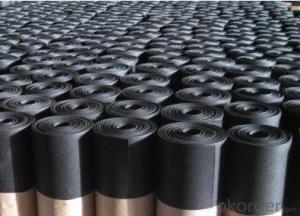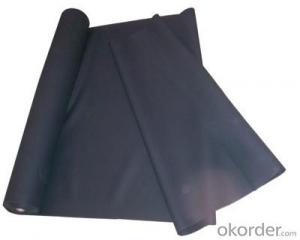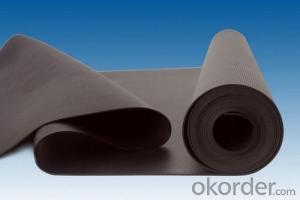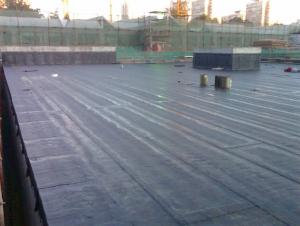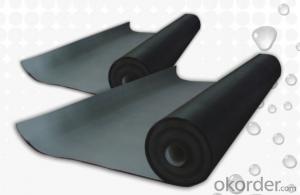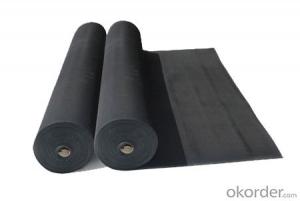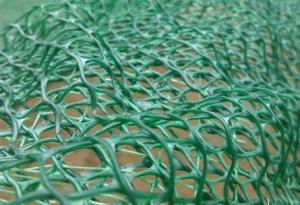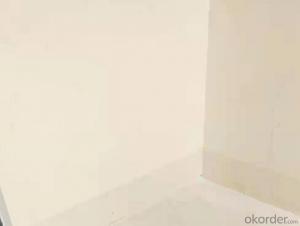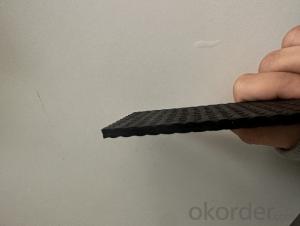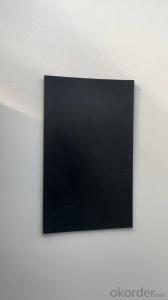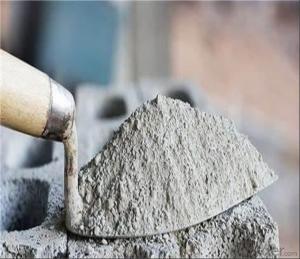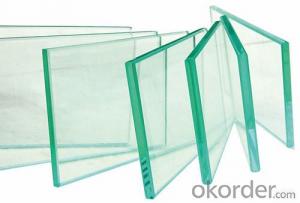EPDM Coiled Rubber Waterproof Membrane with 1.1mm Thickness
- Loading Port:
- Shanghai
- Payment Terms:
- TT OR LC
- Min Order Qty:
- 20000 m²
- Supply Capability:
- 5000000 m²/month
OKorder Service Pledge
OKorder Financial Service
You Might Also Like
EPDM Coiled Rubber Waterproof Membrane with 1.1mm Thickness
Description Of EPDM Coiled Rubber Waterproof Membrane with 1.1mm Thickness:
This waterproof coiled material is of high elasticity with best performance among high polumer
waterproof coiled material in the world.It is also the most typical one in the world.Waterproof coiled material made of ternary ethylene-propylene rubber is produced withthe use of the most advanced contiuous extrusion and vulcanization technology and related equipments which are specially designed for production of such product.It is good in compactness,without bubble and performance difference in length and breadth,perfomances reach or exceedthe demands of GB18173.1-2000 standard.
Main Features of EPDM Coiled Rubber Waterproof Membrane with 1.1mm Thickness:
A.Polyester based SBS Modified Bitumen Waterproofing Membrane
a. Strong impermeability
b. High tensile strength, elongation, ability to adapt the grassroots shrinkage deformation and cracking
c. Puncture-resistant, broken resistant, tear-resistant
d. The corrosion resistance, resistance to mildew, weathering good
e. Construction convenient, hot-melt can be operated Four Seasons Construction, reliable joints
B. Fiberglass based SBS Modified Bitumen Waterproofing Membrane
a. High tensile strength, stability of a good size
b. High Temperature good performance
c. Damage resistance, corrosion resistance, resistance to mildew, weathering good performance
d. Good construction performance, reliable joints.
Specifications of EPDM Coiled Rubber Waterproof Membrane with 1.1mm Thickness:
| Material | EPDM Rubber |
| Size | 1.2m (width)*20m (length) or customized, weldable type 2.05m or 4m width |
| Thick | 1.2mm, 1.5mm, 2.0mm |
| Type | Vulcanized & Weldable |
| Pattern | Non-reinforced (homogeneous) |
| Certificate | ISO9001/14001 |
Applications of EPDM Coiled Rubber Waterproof Membrane with 1.1mm Thickness:
1. Roofs, Basement, Toilet
2. Industrial and civil building waterproofing
3. Geo-synthetic liner for swimming pool, channels, irrigation system
4. Especially suit for projects with high requirements in durability, anti-corrosion and deformation
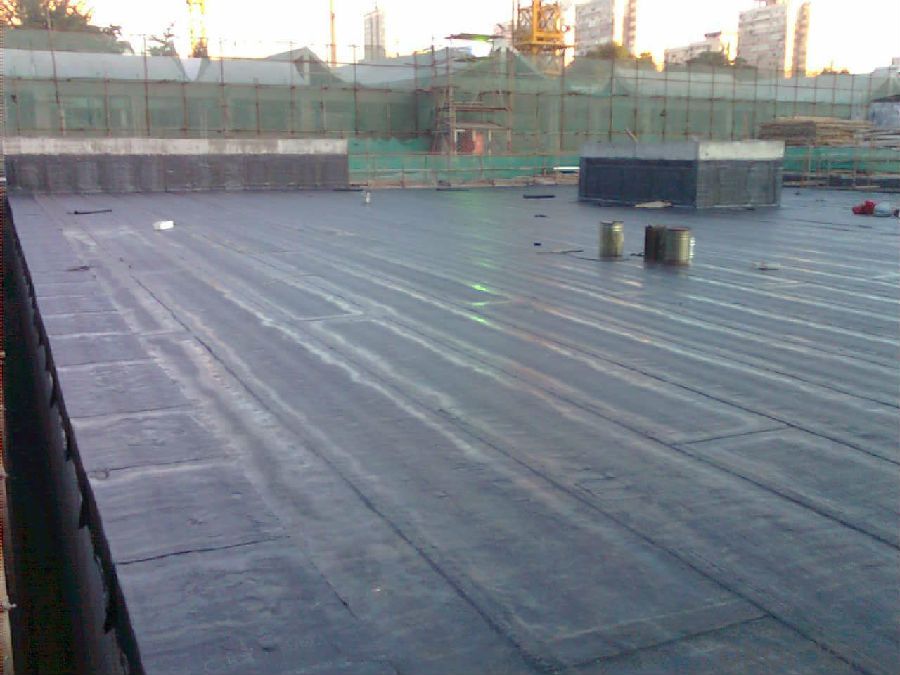
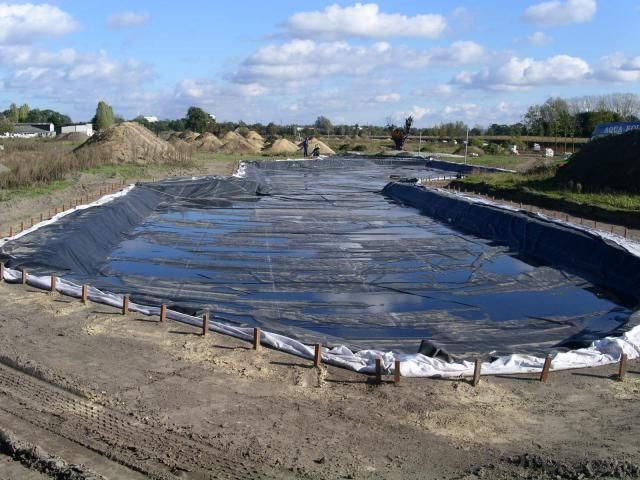
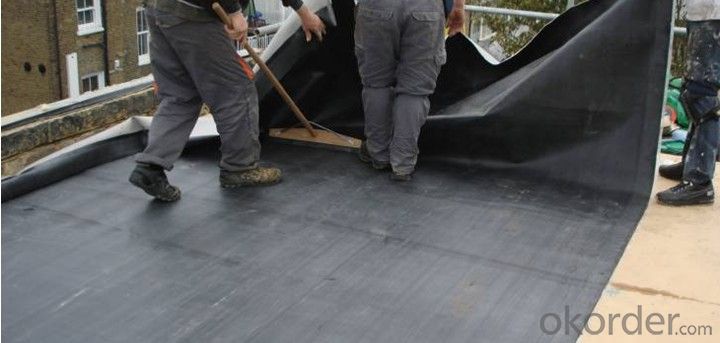
IMages of EPDM Coiled Rubber Waterproof Membrane with 1.1mm Thickness:
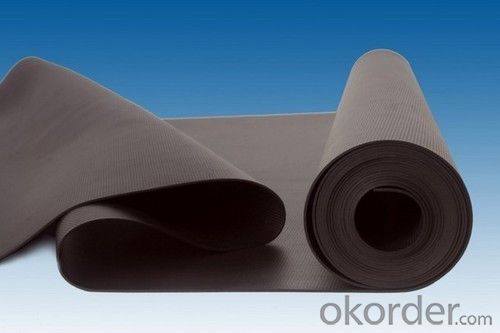
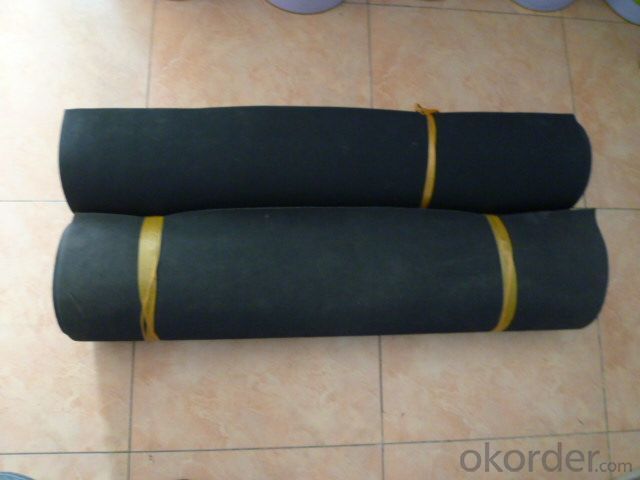
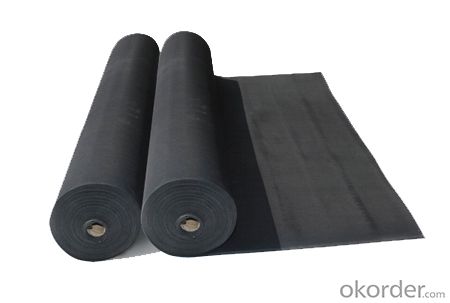
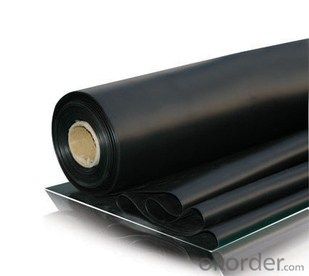
FAQ of EPDM Coiled Rubber Waterproof Membrane with 1.1mm Thickness:
1. What are we supplying?
We are specialized in producing Colorful Asphalt Roof Shingle, SBS/APP modified bitumen waterproof membrane, Self adhesive bitumen waterproof membrane, PVC waterproofing membrane, EPDM rubber roofing membrane, Single Component Polyurethane Waterproof Coating, and Spray Polyurea Waterproof Coating
.
2. How Many years experience do we have?
We have been exported to more than 20 countries in the past 15 years.
3. How long do we usually reply your request?
We always reply our customer within 24 hours.
- Q:Can a waterproofing membrane be used on stucco surfaces?
- Yes, a waterproofing membrane can be used on stucco surfaces. Waterproofing membranes are often applied to stucco surfaces to protect them from water damage and enhance their durability. These membranes create a barrier that prevents water from seeping into the stucco, helping to maintain its integrity and preventing moisture-related issues such as cracking or mold growth.
- Q:Can waterproofing membranes be used on both horizontal and vertical surfaces?
- Waterproofing membranes possess the capability to be utilized on both horizontal and vertical surfaces. These membranes have been specifically engineered to furnish a protective shield against water infiltration, and they can be implemented on a diverse array of surfaces, encompassing roofs, walls, floors, and even subterranean structures. Their application is incredibly versatile, enabling them to safeguard horizontal surfaces, such as flat roofs or balconies, while also affording protection to vertical surfaces, including walls or foundations. The adaptability and resilience of waterproofing membranes render them highly suitable for a vast spectrum of construction projects, guaranteeing that water does not permeate and inflict harm upon the structure.
- Q:Can a waterproofing membrane be used for a retaining wall drainage?
- Yes, a waterproofing membrane can be used for retaining wall drainage. The membrane helps to prevent water from seeping into the retaining wall and causing damage. Additionally, it can also help to channel water away from the wall, promoting proper drainage.
- Q:Can waterproofing membranes be used on shower walls?
- Yes, waterproofing membranes can indeed be used on shower walls. In fact, they are an essential component of shower construction to prevent water leakage and potential damage to surrounding areas. Waterproofing membranes create a barrier that prevents water from seeping through the walls and into the structural components of the shower. They are typically installed behind the tile or other wall covering materials to provide an extra layer of protection. Waterproofing membranes are designed to be flexible, durable, and resistant to moisture, ensuring that the shower walls remain watertight and free from any potential water damage.
- Q:Is a waterproofing membrane resistant to solvents or chemical spills?
- Yes, a waterproofing membrane is typically resistant to solvents or chemical spills. Waterproofing membranes are designed to provide a protective barrier against water and other liquids, including solvents and chemicals. These membranes are often made of materials such as PVC, TPO, or EPDM, which have excellent resistance to various solvents and chemicals. However, the specific resistance may vary depending on the type and composition of the membrane. It is always recommended to check the manufacturer's specifications and consult with professionals to ensure the membrane's compatibility with specific solvents or chemicals before installation.
- Q:What is a waterproofing membrane?
- To prevent the passage of water or moisture, one can apply a thin layer or sheet of material known as a waterproofing membrane onto a surface. This technique is widely utilized in construction, especially in areas where water infiltration is a concern, like roofs, basements, and bathrooms. By acting as a barrier, the membrane effectively stops water from seeping through and causing harm to the underlying structure. Enhancing its effectiveness, multiple layers of the membrane are typically applied, which can be composed of various materials such as rubber, bitumen, or synthetic polymers. In order to endure environmental factors like UV radiation and temperature fluctuations, these waterproofing membranes are meticulously designed to be flexible, durable, and resistant. By keeping buildings dry and safeguarding them from water-related problems such as leaks, mold, and deterioration, they play a crucial role in ensuring the longevity and integrity of structures.
- Q:Can a waterproofing membrane be used in coastal areas?
- Yes, a waterproofing membrane can be used in coastal areas. Coastal areas are prone to high levels of moisture and water exposure, making it essential to have effective waterproofing measures in place. A waterproofing membrane, when properly installed and maintained, can provide a protective barrier against water intrusion, preventing damage to structures and ensuring their durability. However, it is important to select a membrane that is specifically designed for coastal environments, as these membranes are typically more resistant to saltwater and have enhanced durability to withstand the harsh coastal conditions. Additionally, regular inspection and maintenance should be carried out to ensure the effectiveness of the waterproofing membrane in coastal areas.
- Q:Can a waterproofing membrane be used for elevator pits and machine rooms?
- Yes, a waterproofing membrane can be used for elevator pits and machine rooms. Elevator pits and machine rooms are susceptible to water infiltration due to their location or proximity to underground water sources. This can lead to potential damage to the elevator machinery and electrical systems. To prevent water damage and ensure the longevity of the elevator system, it is crucial to apply a waterproofing membrane to these areas. A waterproofing membrane is a protective layer that is applied to the surface of a structure to prevent water penetration. It acts as a barrier against water and helps to keep the area dry and moisture-free. Waterproofing membranes are typically made of various materials such as bitumen, rubberized asphalt, or liquid-applied coatings. When applied to elevator pits and machine rooms, a waterproofing membrane provides an effective solution to prevent water seepage. It can be installed on the walls, floors, and even the ceiling of these areas to create a watertight seal. The membrane is resistant to water pressure, ensuring that no water enters the elevator pit or machine room. Moreover, waterproofing membranes also protect the elevator machinery and electrical systems from potential damage caused by water exposure. These systems are sensitive to moisture and can malfunction or corrode if exposed to water. By using a waterproofing membrane, the risk of such damage is significantly reduced, leading to improved reliability and longevity of the elevator system. In conclusion, a waterproofing membrane is a suitable solution for elevator pits and machine rooms as it effectively prevents water infiltration, protects the elevator machinery and electrical systems, and ensures the overall functionality and durability of the elevator system.
- Q:Can a waterproofing membrane be used in residential construction?
- Yes, a waterproofing membrane can be used in residential construction. Waterproofing membranes are commonly used in various areas of a residential property, such as roofs, basements, bathrooms, and foundations. These membranes are designed to prevent water penetration and protect the structure from moisture-related damages. By installing a waterproofing membrane, homeowners can ensure that their property remains dry and free from water leaks, which can lead to mold growth, structural deterioration, and other costly issues. There are various types of waterproofing membranes available in the market, including sheet membranes, liquid membranes, and self-adhering membranes, each with its own advantages and suitability for specific applications. Consulting with a professional contractor or architect can help determine the most appropriate waterproofing membrane for a particular residential construction project.
- Q:Can a waterproofing membrane be used in renovation projects?
- Yes, a waterproofing membrane can be used in renovation projects. It is a common and effective method to prevent water damage and leakage in areas such as basements, bathrooms, and roofs during the renovation process. By installing a waterproofing membrane, it helps create a barrier against water penetration, ensuring the longevity and durability of the renovated area.
1. Manufacturer Overview |
|
|---|---|
| Location | |
| Year Established | |
| Annual Output Value | |
| Main Markets | |
| Company Certifications | |
2. Manufacturer Certificates |
|
|---|---|
| a) Certification Name | |
| Range | |
| Reference | |
| Validity Period | |
3. Manufacturer Capability |
|
|---|---|
| a)Trade Capacity | |
| Nearest Port | |
| Export Percentage | |
| No.of Employees in Trade Department | |
| Language Spoken: | |
| b)Factory Information | |
| Factory Size: | |
| No. of Production Lines | |
| Contract Manufacturing | |
| Product Price Range | |
Send your message to us
EPDM Coiled Rubber Waterproof Membrane with 1.1mm Thickness
- Loading Port:
- Shanghai
- Payment Terms:
- TT OR LC
- Min Order Qty:
- 20000 m²
- Supply Capability:
- 5000000 m²/month
OKorder Service Pledge
OKorder Financial Service
Similar products
New products
Hot products
Related keywords
